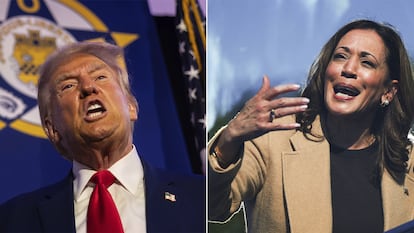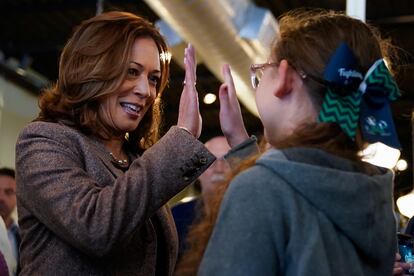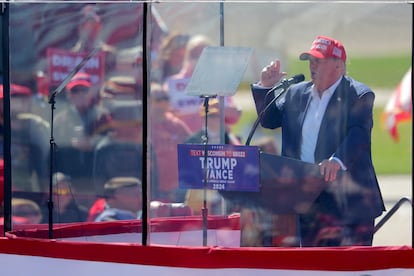Tuesday’s debate against Donald Trump will put Kamala Harris to the test
The standoff between the former prosecutor and the convicted felon could mark a turning point in the race to the White House, just as the June 27 event was a game changer for Biden


If anyone had any doubts about the importance of televised debates in the U.S. elections, Joe Biden dispelled them at the June 27 debate in Atlanta against Donald Trump. The president was knocked out, more by his own mistakes than by the blows of his rival. Another debate — a 90-minute political spectacle in which the two candidates will pit their ideas and personalities against each other — will be held on Tuesday in Philadelphia. This time, the debate is between a former prosecutor, Kamala Harris, and a convicted felon, Trump, with millions of voters acting as the jury. But it is primarily the Democratic candidate who is on trial.
U.S. voters know Trump, for better and for worse. He has been a fixture of American politics since he came down the golden escalator of Trump Tower in New York almost a decade ago to announce his candidacy for president. He has won and lost elections. The standoff on Tuesday will be his seventh presidential debate. No one else in the history of the United States has taken part in so many debates. Harris, on the other hand, is a novice in these matters.
“The Sept. 10 debate will be another ‘reset’ for the 2024 campaign. There’s little chance that voters’ opinions of Trump will change. Instead, the big question is whether it impacts the way voters perceive Harris,” Amy Walter, director of the influential Cook Political Report, tweeted earlier this month. “The fact that the debate is taking place at a time when many voters don’t have a firm opinion/idea of Harris makes this a uniquely consequential fall showdown,” she added.
The Democratic candidate knows how much is at stake. She had her first preparatory sessions a few weeks ago at Howard University in Washington — her alma mater — and has practically locked herself away as she methodically trains for the debate in Pittsburgh, the second-largest city in Pennsylvania. Harris is prepping with a team led by Karen Dunn, a prestigious lawyer who has been getting Democratic candidates ready for debates since 2008.
At the Omni William Penn Hotel, Harris is practicing on a fake stage with lecterns and a sparring partner, Philippe Reines, who played the role of Trump to prepare Hillary Clinton in 2016. For added realism, Reines uses Trump’s same gestures, wears a long red tie and even a blonde wig. “Most viewers have no idea how meticulous debate preparations can be at this level — no chances taken,” Alan Schroeder, one of the leading experts on presidential debates, posted on X a few days ago.

Dunn also coached Harris for the 2020 vice presidential debate against Mike Pence. What is most remembered from that standoff is how she was able to stop Pence’s interruptions: “I’m speaking.” But it will be difficult for her to use this line again. At the debate, the microphone of the participant who does not have the right to speak will be muted — a rule that Harris opposed. While the Democrats demanded this rule at the first debate broadcast by ABC News, it ended up benefiting Trump, who seemed more restrained and moderate.
The rest of the rules are unchanged. The debate will be held in a studio, without an audience. There will be no opening statements. Moderators instead will go straight to the questions, which have not been announced. Each candidate will have two minutes to answer, followed by one minute of reply and one minute of counter-reply. Graphics and other objects will not be allowed, nor will any previously prepared notes. Candidates will be given paper, a pen and a bottle of water. There will be two commercial breaks during which candidates will not be able to speak with their advisers. Trump will have the last word after drawing lots.
Harris has the challenge of presenting a presidential image. She must maintain the difficult balance of being both a candidate for continuity — as vice president — and for change. She must defend Biden’s legacy, but not be tied to it. Harris needs to instill confidence and appear responsible, show experience and readiness for the job, but combine these qualities with the joy, optimism and a sense of a fresh start. Age is on her side, when it comes to sending a forward-looking mission: she is 59 years old, while Trump is 77. And it is at the crux of her campaign, which has galvanized around the slogan “We are not going back.” At the debate, Harris is likely to put more emphasis on presenting Trump as a self-centered egoist than as a danger to democracy. Another challenge for Harris will be to refute her rival’s falsehoods, something that Biden was unable to do.
Trump, meanwhile, prides himself on not preparing for debates, even though he does. His sessions are taking place at his golf club in Bedminster in New Jersey, although on Saturday he found time to give a rally in Mosinee in Wisconsin, a key swing state. Given his experience, Trump prefers more informal preparatory sessions, in which his advisers ask him difficult questions, even on sensitive issues, such as his criminal cases or his position on abortion. He will not campaign on Monday, in order to continue preparing for the debate.
The former president has resorted to personal attacks against Harris during the campaign, against the advice of his advisers. He aims to present her as a dangerous radical, question her record as a prosecutor, and hold her responsible for the failures of the Biden administration. Trump paints an apocalyptic picture of the United States under Biden, while claiming it was in a much better state under his presidency. He will also have to avoid making misogynistic and racist comments, as he has done repeatedly at recent events.

Following Harris’ recent interview on CNN, Alan Schroeder commented: “The Trump campaign will be scrutinizing this interview for tidbits they can use in their debate prep. Her self-possession should scare them. On the debate stage, her calmness and restraint will contrast sharply with Trump’s dramatic excess.”
In an interview last week with Fox News host Sean Hannity, Trump hinted that he would hold himself back. “When I had Biden, you and I had the same discussion. And I let him talk. I’m going to let her talk,” he said, when asked how he would face Harris. In that same interview, he again lashed out at the Democrat: “Look, this is a woman who is dangerous. I don’t think she’s too smart.” The former president also defended his way of preparing for debates. “You can go in with all the strategy you want but you have to sort of feel it out as the debate is taking place,” he argued, finishing with a quote from boxer Mike Tyson: “Everyone has a plan until they get punched in the face.”
Trump has enlisted the help of Tulsi Gabbard, who successfully upset Harris in the 2019 Democratic primary debates and is now a Republican convert. “It’s really just in sharing the experience that I had with her on that debate stage and, frankly, helping to point out some ways that Kamala Harris has already shown that she is trying to move away from her record, move away from her positions, and how that contradicts the positions and statements that she’s making now that she is the Democratic nominee,” Gabbard said last week in an interview with CNN. The now Trump adviser cautioned: “I think Kamala Harris has a lot of experience. She should not be underestimated.”
The former president has also claimed that the debate will be rigged against him — an argument he commonly uses to lower expectations and shift the blame. “I’m going into very hostile territory shortly on a debate with ABC,” he said Friday in New York. “ABC, I think, is the worst of everybody. I think they’re the worst, they’re the nastiest. They’re as bad as you can be, They’re worse than NBC, which is saying a lot,” he added. “This playbook is familiar and wearisome,” David Axelrod, who was Barack Obama’s chief strategist, said on social media, in response to Trump’s claims that the debate will be unfair. The debate will be moderated by David Muir and Linsey Davis, popular presenters of the network.
The candidates will spar on issues such as inflation, taxes, immigration, abortion, crime and foreign policy, but it will be character — the role each adopts and how they manage to depict their opponent — that will weigh most heavily in the debate, along with any surprises. The candidate who strikes the right tone to win over moderate voters stands a lot to gain. With the exception of Trump’s State of the Union addresses as president, which Harris attended as a senator, along with hundreds of other attendees, Tuesday’s debate is the first time the two will be in the same room. It is likely that they will not even greet each other, just as Trump and Biden did not greet one another in Atlanta.
The debate is being held at the National Constitution Center, a museum devoted to the U.S. Constitution in the birthplace of American democracy, in the heart of Philadelphia’s Independence National Historical Park, a place visited by millions of citizens every year. Trump and Harris will be just 500 meters from Independence Hall, where the founding fathers signed the Declaration of Independence and the Constitution, with its resounding opening: “We the people.”
The U.S. presidential election will be held on November 5, and the polls are very close in the swing states, including Pennsylvania, where the debate is being held and where the candidates are campaigning tirelessly. No rally is as crucial as Tuesday’s debate, which could be the only one between Trump and Harris: so far, no others are scheduled. It is unusual for a candidate to win a knockout victory, like Trump did at the June 27 debate. The standoff will probably be decided on points. And the candidate who instills confidence in undecided voters in swing states will be one step closer to the presidency.
Sign up for our weekly newsletter to get more English-language news coverage from EL PAÍS USA Edition
Tu suscripción se está usando en otro dispositivo
¿Quieres añadir otro usuario a tu suscripción?
Si continúas leyendo en este dispositivo, no se podrá leer en el otro.
FlechaTu suscripción se está usando en otro dispositivo y solo puedes acceder a EL PAÍS desde un dispositivo a la vez.
Si quieres compartir tu cuenta, cambia tu suscripción a la modalidad Premium, así podrás añadir otro usuario. Cada uno accederá con su propia cuenta de email, lo que os permitirá personalizar vuestra experiencia en EL PAÍS.
¿Tienes una suscripción de empresa? Accede aquí para contratar más cuentas.
En el caso de no saber quién está usando tu cuenta, te recomendamos cambiar tu contraseña aquí.
Si decides continuar compartiendo tu cuenta, este mensaje se mostrará en tu dispositivo y en el de la otra persona que está usando tu cuenta de forma indefinida, afectando a tu experiencia de lectura. Puedes consultar aquí los términos y condiciones de la suscripción digital.








































